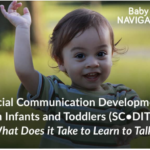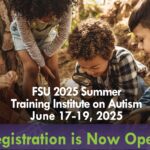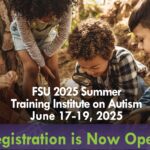
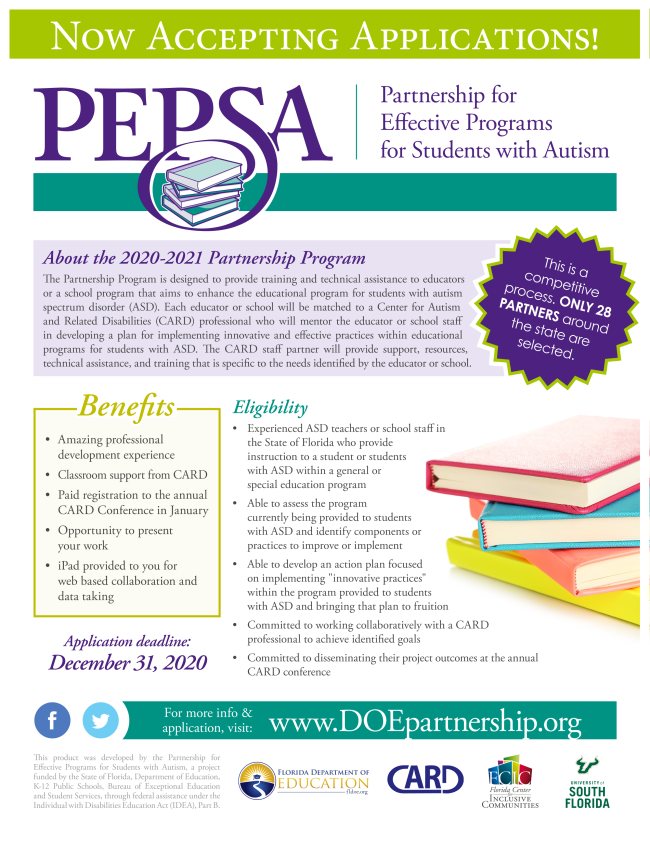
PEPSA 2020-2021- Application Deadline Extended to January 7, 2021!
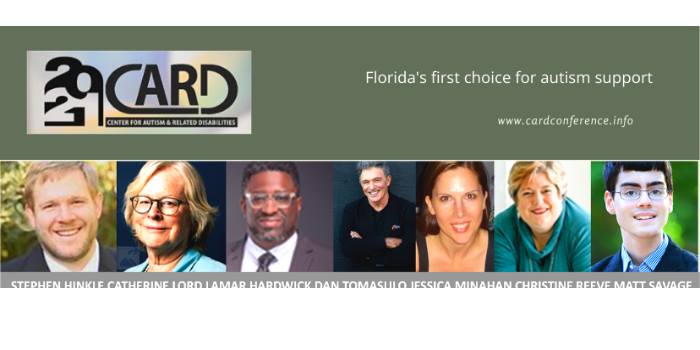
2021 CARD Conference
Diana McLendon Excellence in Teaching Award
 This award is being offered in the memory of Diana McLendon who lost her battle with Leukemia in December 2019. Diana was the Autism Spectrum Disorder (ASD) Program Coordinator for the Department of Education, the statewide Center for Autism and Related Disabilities (CARD) centers, Partnership for Effective Programs for Students with Autism (PEPSA), and Autism Navigator.
This award is being offered in the memory of Diana McLendon who lost her battle with Leukemia in December 2019. Diana was the Autism Spectrum Disorder (ASD) Program Coordinator for the Department of Education, the statewide Center for Autism and Related Disabilities (CARD) centers, Partnership for Effective Programs for Students with Autism (PEPSA), and Autism Navigator.
Making Connections: A Parents Series for Supporting Your Child with ASD
Week 1 – Where to start with social skills?
Join our weekly online series to learn ways to help your child learn the foundation skills of social skills. During the webinar, you are encouraged to ask questions, share information, celebrate successes and problem solve challenges specific to your particular situation, to the extent you are comfortable.
WHEN: Every Thursday in October; Beginning October 1st @11:00AM – 12:00PM CST/12:00PM – 1:00AM EST
WHERE: Will be held online via Zoom; Invitation will be provided after registration is complete.
Please register by clicking HERE<<<

Coping with COVID-19 While on the Spectrum
FSU Center for Autism and Related Disabilities is partnering with the LeRoy Collins Leon County Public Library System to provide a webinar on how COVID-19 affects families that have an individual on the autism spectrum and how to support them and help maintain their physical and mental health.
Topics will include how to reduce behavior challenges related to hygiene and PPE usage, talking about the pandemic, supporting pandemic-related educational challenges, and how to access available resources, including those offered by FSU CARD.
When: Thursday, October 1, 2020 @ 6pm EST/ 5pm CST
To join the webinar: https://fsu.zoom.us/j/7535277415
Facebook Event Page: https://www.facebook.com/events/2928493900585835/

***Posting on behalf of FSU College of Education***
- Provide basic Wi-Fi connection with ability to access Zoom
- Complete consent form and agree to have you child’s tutoring videoed for supervision purposes
- Collaborate with assigned tutor to determine tutoring schedule and focus
- Share appropriate school materials and information with tutor when applicable
- Provide a quiet spot for child to receive tutoring with parent/guardian available if needed
- Be available to communicate with tutor’s FSU supervisor if needed

***Posting on behalf of The LeRoy Collins Leon County Public Library System***
***Posting on behalf of FSU Multidisciplinary Center***
***Posting of behalf of Arts for All Florida***

- Don’t We Already Do Inclusion?
- From Text Maps to Memory Caps: Differentiating Instruction in K-12 Classrooms
- Dwelling in Possibility: The Values, Beliefs, & Habits of Inclusive Schools
- The Problem with Behavior Problems: Supporting Students with Autism & Other Disabilities
- How to make interactive classroom materials that engage a variety of learners
- Ways to adapt the classroom for a variety of learners
Tips to Stay Organized and Create Independence


Law Enforcement Trainings
At one time or another, we all need the assistance of law enforcement to help us in a time of need. Sometimes this need involves someone who may be on the autism spectrum.

For the past three years, FSU CARD has been partnering with the Florida Sheriff’s Association to provide autism education to law enforcement as a part of their Crisis Intervention Training (CIT).
During CIT week, law enforcement spends a total of 40 hours learning about various local and state health and human service agencies and the populations they serve. More importantly, during this time, they learn about how to adapt their responses to these specific populations to better serve, support, and protect them and the community. During the autism segment, officers learn about all the characteristics of ASD, communication strategies, de-escalation techniques, and other precautions. This is demonstrated through viewing multiple videos, participating in hands-on activities, and relaying details of actual incidents where law enforcement has assisted someone with ASD. Another important aspect covered is what to do if someone with ASD were to go missing due to elopement or wandering. Highlighted are cases of those who’ve wandered who either had an unsuccessful outcome versus a successful outcome and how to increase the odds that the individual is found safe.
If anyone involved in law enforcement is interested in learning more about this training, please reach out to FSU CARD via our online training request form and we will be happy to discuss how we can help!
Hyperlink to our Training request form: https://app.smartsheet.com/b/form?EQBCT=9c3a992ad1cb4ecca2222dd65fadef50Taylor Fabrega’s Farewell Letter
By: Taylor Fabrega
Dear friends,
 It has been an absolute honor and privilege to serve my community through the esteemed Autism Institute in the College of Medicine. This decision is bittersweet as I am following my dream to move to New England for new opportunities and personal growth but will deeply miss the people that have made this work so fulfilling.
It has been an absolute honor and privilege to serve my community through the esteemed Autism Institute in the College of Medicine. This decision is bittersweet as I am following my dream to move to New England for new opportunities and personal growth but will deeply miss the people that have made this work so fulfilling.
My hometown of Tallahassee and alma mater of Florida State University will always hold a special place in my heart. I would like to thank each and every member of the organization, including clients and collaborators, that have had such a profound impact on my life and career path. There were many lessons learned in addition to the true comradery I have been lucky to share throughout my time in this role.
It’s hard to believe that the middle school clients I first took on when beginning this job are now adults, with many now looking for their own jobs or starting school! I look forward to receiving updates from my soon-to-be former colleagues and “seeing” everyone at the annual CARD Conference online in January.
With immense gratitude,
Taylor Fabrega
Autism Consultant

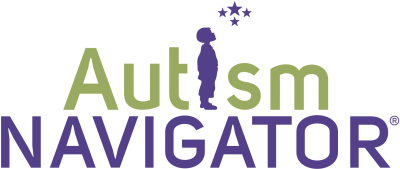
Free access to the Autism Navigator® How-To Guide for Families
FSU CARD is pleased to continue to offer free access to our CARD families with young children not yet old enough to enroll in kindergarten to the online Autism Navigator® How-To Guide for Families course. This self-paced course will teach caregivers how to use strategies and supports in their everyday activities as well as provide them with access to a variety of “tools” to chart their child’s developmental growth and monitor meaningful outcomes. This online course is full of video libraries to illustrate how to promote learning and development of their child with ASD. For more information about the Autism Navigator® How-To Guide for Families, please visit their website . If you are a parent of a young child with FSU CARD and would like to request a code to the How-To Guide for Families, please click this link: https://firstwords.fsu.edu/card_h2g/sign_up.php
In addition to the online course, parents that enrolled in the How-To Guide for Families, will be invited to join a weekly meetup (a Guided Tour) where parents will have the opportunity interact with other families with similar issues from the convenience of their computer, phone or tablet. We hope to start the next CARD facilitated How-To Guided Tour as soon as 10 to 12 families express an interest in getting one started.

Baby Navigator Website
The Executive Director of FSU CARD and Director of the College of Medicine’s Autism Institute, Dr. Amy Wetherby, launched a new website, BabyNavigator.com, that walks parents through early childhood development and alerts them to early signs of autism.
Click on the article below for more information. HERE →
Share with CARD!
FSU CARD is continuously looking for clients who would like to share their art, writing pieces, or success stories in our quarterly newsletter. If you are interested in sharing for our next issue, please send a message and image electronically to Tammy Dasher (tammy.dasher@med.fsu.edu). All art or writing pieces should be titled. Select submissions will be chosen for each edition of the newsletter; artists and authors will be notified if their article is chosen.

Health & Nutrition
Emotional Eating in the Time of Coronavirus
Taken from the article: “The anxiety and worry about coronavirus can trigger eating. The public health restrictions limiting social contact could have the unintended consequence of increasing emotional eating. Typically, when you’re at work the opportunities to snack are limited but if you’re working from home the goodies in the refrigerator or pantry are only a few steps away. A two-pronged approach would help to minimize emotional eating. This entails reducing emotional distress and altering the environment to reduce the opportunities to snack.”






